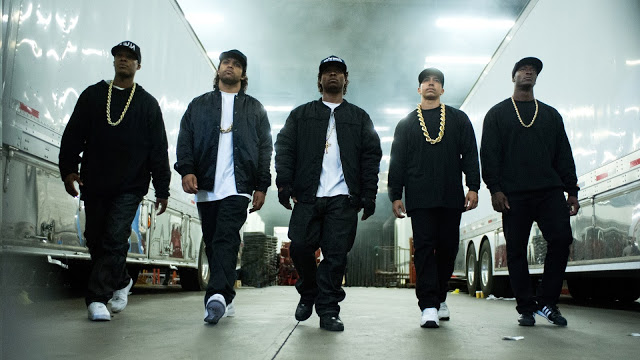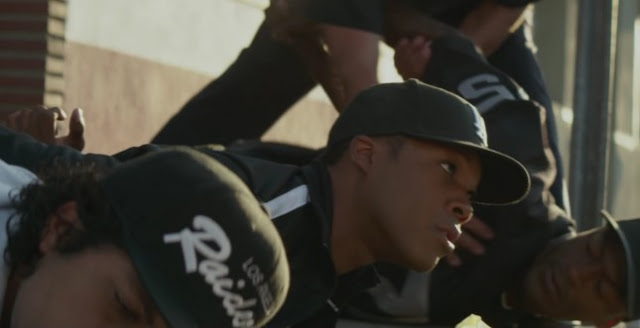F. Gary Gray’s Straight Outta Compton tells the story of the rise and fall of N.W.A., a rap supergroup featuring Ice Cube (O’Shea Jackson Jr., Cube’s real-life son), Dr. Dre (Corey Hawkins), and Eazy-E (Jason Mitchell). For those of you not well-versed in late-20th-century hip-hop lore—not that I have anyone in mind—”N.W.A.” stands for “Niggas with Attitude”. It does not require a degree in linguistics or cultural studies to recognize that this was a provocative name for a gangster rap group, particularly one that delivered such ferocious, uncompromising anthems about racial inequality and police brutality. The problem with Straight Outta Compton—what caps it at the level of passable entertainment rather than world-conquering triumph—is that it relays N.W.A.’s history through the form of dutiful hagiography. The members of N.W.A. became legends largely because of the way they upended existing notions of how music could be made, but Straight Outta Compton hits most of the expected beats (though it skips a few others) without ever straying from the sheet music. The result is a perfectly enjoyable movie that often feels like a carefully curated Wikipedia entry.
That doesn’t make it bad. Much of Straight Outta Compton is easily entertaining, especially its zippy first half. It helps that the actors are appealing, particularly Hawkins, who’s able to convey Dre’s musical genius without letting loose on the mic. Behind-the-scenes glimpses of artists sculpting their work are always satisfying, and an early scene of Dre coaxing Eazy on his delivery (for a track that would become “Boyz-n-the-Hood”) demonstrates N.W.A.’s dedication to musical craft as well as social upheaval. And once Paul Giamatti shows up as music impresario Jerry Heller (marking the second time this year he’s played a wig-wearing manipulator of 1980s talent), the movie tracks the methodical process by which a handful of young rappers became objects of fan worship and, more importantly, persons of governmental interest.
Which is really the issue at hand. Straight Outta Compton is formally a musical biopic, but despite a number of lively concert scenes with the actors reasonably impersonating their characters’ vocals (Gray has been coy about lip-syncing, which presumably means most of the performances were dubbed), the music itself is secondary to the film’s frightening depiction of state-sponsored racism. Gray depicts Compton not as a hellhole but as a hardscrabble neighborhood where black youths are constantly harassed by thuggish cops. He isn’t much for filmmaking style (the occasional tracking shot from Matthew Libatique notwithstanding), but he knows how to make a point with blunt force, as in a deeply disturbing scene where police humiliate a handful of rappers in Raiders gear for literally standing on a street corner. The movie also pointedly recreates real-life incidents of more systemic abuses of power, as when the FBI sent N.W.A. an official letter condemning its lyrics, or when Detroit police arrested the group following a concert. If nothing else, Straight Outta Compton ably illustrates why one of N.W.A.’s biggest hits is called “Fuck tha Police”.
Of course, there is plenty else, which is where the problems crop up. Straight Outta Compton runs well over two hours, and it often feels like a frantic attempt to compress as much N.W.A. mythology into a single film as possible. And so, not only do we witness the group’s rise to fame and fortune. We also experience the friction between Ice Cube and Eazy, followed by Cube’s departure and the ensuing battle between Eazy’s Ruthless Records and Cube’s Bomb Squad. We follow Dre as he leaves the group and forms Death Row Records with the menacing Suge Knight (if there is one thing everyone in this movie seems to agree on, it’s that Suge Knight is an asshole) and watch as he helps mold aspiring artists with the names of Snoop and Tupac. We discover, in a passage of tear-jerking sap, that Eazy is afflicted with AIDS. And, in a bizarre inside-baseball segment that feels several films apart from the superhero origin story that gives the movie its early oomph, we absorb a bizarre amount of detail devoted to Eazy and Jerry’s uncertain business relationship.
None of this is bad, necessarily. It’s just nothing we haven’t already seen in a million different rags-to-riches-to-breakup biopics. And that level of familiarity strangles Straight Outta Compton. It results in a sensation of conformity, a notion that offends the very iconoclasm that N.W.A. represented. This was too important and influential a music group for a film about it to feel so careful and conventional. But then, perhaps it’s fitting that Straight Outta Compton starts to fizzle right when N.W.A. starts to break up. Whether you’re a rap group or a movie, it’s tough to stay on top of the world forever.
Jeremy Beck is the editor-in-chief of MovieManifesto. He watches more movies and television than he probably should.


